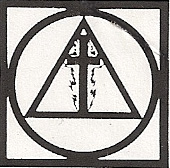The Christmas tree comes to us from Germany. Martin Luther is credited with being inspired by the starry heavens one night, and expressing his feelings to his family by bringing a fir tree into his home, and attaching lighted candles to its branches. Fir meant fire, and fire is an ancient symbol for spirit. The tree also pointed toward the heavens.
Evergreens were thought to represent the ever-burning fire of life. The color green signified the life force through the year. Eventually decorative balls represented the planets, while the star that radiates from the top reminds us of Bethlehem. The entire tree and decorations teach us that the universe is witness to the Incarnation.
Red at Christmas reminds us of the fire of the Spirit. Green affirms nature, and the ongoing life. And in the Incarnation, Spirit unites with nature.
In fact, the Christmas tree symbolizes to us a further appreciation of Jesus’ birth. It is a means of retelling a miracle in a colorful and beautiful way so that we can further understand and appreciate Jesus’ entering our world.
Actually, the tree is a reinterpretation of pagan rites, along with the use of other greens and decorations to commemorate in ancient times a celebration of the feast of Saturnalia – the birth of the Sun in the sky at the Winter Solstice. Along with the giving of gifts, the feast was later adopted as a Christian celebration, with the selection of December 25th to announce the birth of the Son of God to the world.
The tree also tells the story of a cosmic event – a mystery. In personal celebrations of Christmas the tree begins its use in the 16th century, and is later brought to America by German immigrants.
The heavens and earth rejoice in the coming of the Lord of Life.
-adapted from The meaning of a Christmas Tree by William V. Rauscher

